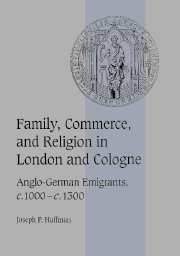Book contents
- Frontmatter
- Contents
- Preface
- List of abbreviations
- The wards of medieval London
- The parishes and districts of medieval Cologne
- Anglo-Cologne family genealogies
- Introduction
- Part I The historical background: Anglo-German commercial foundations and the city of Cologne
- Part II Anglo-Cologne family, property, and inheritance ties
- Part III Anglo-German religious and cultural life
- Chapter 8 Confraternities, expatriate monks, pious legends, and pilgrims
- Chapter 9 Clerics, canon law, crusaders, and culture
- Conclusion: A reappraisal of the Anglo-German nexus
- Appendix: The archbishops of Cologne
- Select Bibliography
- Index
- Cambridge Studies in Medieval Life and Thought Fourth series
Chapter 9 - Clerics, canon law, crusaders, and culture
Published online by Cambridge University Press: 02 November 2009
- Frontmatter
- Contents
- Preface
- List of abbreviations
- The wards of medieval London
- The parishes and districts of medieval Cologne
- Anglo-Cologne family genealogies
- Introduction
- Part I The historical background: Anglo-German commercial foundations and the city of Cologne
- Part II Anglo-Cologne family, property, and inheritance ties
- Part III Anglo-German religious and cultural life
- Chapter 8 Confraternities, expatriate monks, pious legends, and pilgrims
- Chapter 9 Clerics, canon law, crusaders, and culture
- Conclusion: A reappraisal of the Anglo-German nexus
- Appendix: The archbishops of Cologne
- Select Bibliography
- Index
- Cambridge Studies in Medieval Life and Thought Fourth series
Summary
Among the scattered references to Anglo-German cultural life we find many clerics who made use of this nexus to advance their careers in teaching and leadership within their religious orders. This sometimes brought them onto the political stage, where they proved themselves quite adept at making use of pan-European contacts for their own ends. As the age of regional cathedral schools gave way to that of universities comprised of nationes of foreign students, the confluence of English and German clerics naturally increased. Since the educational goal of a German scholasticus was preparation for notarial service at the chanceries of bishops and emperors, few studied abroad in the twelfth and thirteenth centuries. Joachim Ehlers has found, for example, that of the approximately 646 German bishops from 1002 to 1197 only 25 had part of their formal education outside Germany. Two of the most important archbishops of Cologne during this period, Rainald of Dassel and his successor Philip of Heinsberg, were among this select few. Hence until the early fourteenth century the direction of “the emigration of learning” ran generally from England to Germany.
Perhaps the most widely traveled expatriate scholar from England was Gervase of Tilbury (fl. 1211). Born in Essex, he spent much of his youth in Italy. He studied and then taught law at Bologna for several years before returning to England in the familia of Earl Patrick of Salisbury.
- Type
- Chapter
- Information
- Family, Commerce, and Religion in London and CologneAnglo-German Emigrants, c.1000–c.1300, pp. 217 - 239Publisher: Cambridge University PressPrint publication year: 1998



